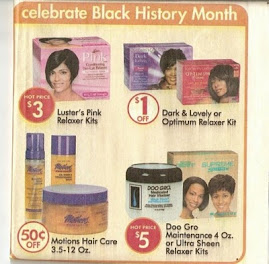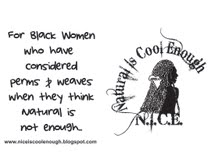Below a hairstory is told by Dana. Dana wrote to me and asked if I would post her hairstory. So here it is. As with everyone who has shared their hairstory on this blog...thank you Dana. Each one of us has a story but the bottom-line is that no matter who you are, no matter what your race, Natural Is Cool Enough and that's N.I.C.E.!
Dana’s Hairstory
I may not have the usual hairstory common to women and men of the African Diaspora, but my story is still pretty common, and it runs pretty deeply into my sense of self. I grew up as a young girl with a medium-sized curly ‘fro. For a child of the early 80s, this might not have been so unusual, except that my hair was stark white. I didn’t look like anyone that I knew – no relatives, and certainly not anyone else in my neighborhood. My brothers ridiculed me constantly, saying I must be adopted and calling me “Frizzy,” “Fuzzy,” or “Monkey,” for a good 7 years until I eventually responded to those as if they were my name. Kids at school were no more understanding, asking all kinds of questions, pulling my hair at random and screeching in delight when it bounced back, and asking in disgust why I “made” it that way. While about 10% of my classmates were African-American, all of them either sported straightened hair or tightly braided pigtails with pink or purple plastic balls at the tops. Everyone looked cute and girly, and I seemed to be the only girl I knew whose hair was “unruly,” “messy,” “dirty-looking,” like a “rat’s nest.” There was a lot of shame around having hair like mine. Living in a world of straight-haired girls, I longed to be normal like them, to be attractive to adults like them, to look “clean.” I longed for satiny dark hair that one could brush through, rather than the mess on my head that ripped out painfully in chunks if I even tried to put my fingers through it like the women on TV. I only made the situation worse by avoiding having my hair brushed as often as I could, because the brushing sessions with my mother brought torrents of hot tears and screaming. My mother had ironed her hair during the 60s and 70s in her own shame, and then lost it all as a result of cancer. She had no idea how to manage mine, and considered items like conditioner a luxury we couldn’t afford, so the harsh shampoos we used dried it out more and more. In the winter the dry air caused portions of it to hang while the shorter parts stayed close around the crown of my head, giving, to say the least, a very freakish effect. In the summer, no matter what I did, the humidity made it all puff up in masses of knots that I knew I would never get out. Swimming or getting rained on would make this even worse.
Between the ages of 9 and 13 I tried relentlessly to straighten my hair, brushing it over and over again (causing me to lose about half of it), try to FORCE it to stay straight. If the ends curled up, I grabbed the scissors and recklessly cut them off. As is true for just about everyone, middle school was hell. The in hairstyle was to have straight hair with a huge curled fan of fried and sprayed hair over the forehead. I remember looking at Kristy Yamaguchi’s hair as she skated in the Olympics and trying again and again to make mine just like it. I destroyed my hair, which now had the required bangs, by straightening it out daily with the curling iron, hairspray, and mousse, and then trying hopelessly to shape it until it ended in a shriveled crunchy ball in the middle of my forehead when the hairspray dried. I often spent my mornings in front of the mirror in tears, hating myself and this ugly hair I was cursed with. I often got several comments a day during these years about how I should cut my hair or do my bangs differently, from people who just didn’t understand that I had no control over what my hair did. I was kind of in shock that so many people would be so concerned about my HAIR. The comments made me even more self-conscious.
When I got to high school, a lot of things changed for me. I started to feel like trying to fit in was not working; I knew I was different - why should I care anymore if I stood out? I started to wear vintage clothes so I knew I would be the only one wearing that outfit when I went out of the house, and I let my hair be curly again – no bangs, no sprays. For the first two years girls constantly came up to me with a disgusted look and asked why I would perm my hair when straight hair was in. When I said this was my natural hair, they looked at me with a mix of horror and pity. My hair became political – it was anti-conformist, it was anti-fake. Racist people would sometimes come up to me and ask if I was Black or “mixed.” I responded that I was mostly Italian/Sicilian and that it was likely that somewhere in my family there were people from Northern Africa – at least I hoped so. This was not what they were expecting at all. I had taken their intended insults as a complement. Embracing my hair as part of a long heritage was not only grounding - I found it really freeing. I soon noticed that now that I no longer cared what other people thought, and stopped trying so hard to look like everyone else, I developed quite a little fan following at school. It was very odd to suddenly have girls following me around and asking tips on how to look like me. Guys followed me everywhere too, for different reasons. It was nice, and it annoyed me at the same time – weren’t these the same people who ridiculed me only a few years ago? Were they really so insecure that they gravitated toward anyone with enough confidence just not to care anymore?
Within two weeks of college and now attempting to sport a bit shorter hairstyle, I started going out with the man who is now my husband. As an affectionate term, and being – if you’ll pardon my eye rolling – a man, he immediately decided to call me “Mophead.” He even wrote stupid songs and poems using that awful name, not understanding why it might bother me. “But your hair looks like the end of a mop,” he said matter-of-factly, believing that direct visual comparisons should be neither a complement nor an insult. It just was what it was. About a month later, my Jamaican roommate (who had had straightened hair most of her life) helped me cut my hair. I asked her to trim about a centimeter off the edges to clean up the split ends. She took an inch. I screamed when I saw it, and she thought I was overreacting until I showered and let it dry – it looked like a tightly-curled helmet. My boyfriend walked in and said something to the effect of, “It looks like a short mop, now.” Not cool.
That was more than a decade ago, and I never let another person touch my hair again. I grew it back out, and do nothing but use a minimal amount of gel and a conditioner marketed to women of color (which several times a store cashier has asked if I made a mistake in purchasing). As styles change, there have been countless women who suggest that I should straighten my hair, cut it, shape it, dye it, or otherwise change it because apparently my hair is still worth that much of other people’s time. (Women also will often tell me that I should start tanning my skin – which doesn’t tan – because apparently there is something embarrassing about my “pasty” arms and legs. I find this incredibly odd considering the racist history of our country. My skin is what it is – I don’t want other people to change theirs, so why should I change mine?) A lot of men have a different reaction, even asking to touch my hair or mentioning how much they like it. My husband still affectionately but cluelessly calls me “Mophead” from time to time, to remind us of our college days.
Twelve years ago I moved to NYC and majored in Africana Studies at NYU, then moved to the Bronx to become a high school teacher. I don’t look like the majority of my friends, my co-workers, or my neighbors. Now that I am in Miami getting a Ph.D. in the History of Women’s Activism in the African Diaspora, I see more pale faces and hair than I have in a decade. It feels strangely like I stand out more now, like I am out of my community. I feel more different than I have in a long time. But I find that it is still true: on the days when I don’t care what people think and just feel good about living my life, I get a whole lot of compliments and smiles. On the days when I look down and feel awkward, no one says anything. Confidence attracts, no matter what your style, ethnic background, or hair type. It seemed weird to me that people always spent so much time thinking about how I looked, but now as I look back on this long Hairstory, it seems even weirder to me that I spent even longer thinking about it than they did.






















